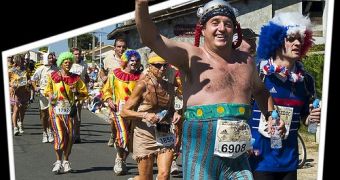A team of researchers and runners from the Heart and Stroke Foundation, in Canada, wanted to find out whether running a marathon was a healthy activity or whether it could also damage the heart, so they used the V02 max test and the magnetic resonance imaging to see what's going on in a marathoner's heart.
Dr. Eric Larose said at the Canadian Cardiovascular Congress 2010, co-hosted by the Heart and Stroke Foundation and the Canadian Cardiovascular Society, that “marathon runners can be a lot less fit than they think,” because normally, when preparing for a marathon, you need real aerobic fitness to prevent a direct impact on the heart.
The researchers used MRI to better assess what was going on inside the heart and they found out that when one of the 17 segments of the left ventricle is injured, its neighbors take over its task, so in this case, the heart actually seems much stronger than it really is.
Dr Larose, who is professor of medicine at Laval University and a cardiologist and clinical researcher at 'Institut Universitaire de Cardiologie et de Pneumologie de Québec (IUCPQ)' in Quebec City, adds that “the heart isn't simply playing tricks - this may be an important adaptive survival mechanism, like the way the brain can switch function after a stroke.
“Unfortunately, as a result, the data produced by traditional means may be inconsistent and misleading, [so] this means that, short of performing MRI in everyone, we are left with only one practical test that can accurately tell runners their level of cardiac fitness under stress.”
The team also used the V02 max test, which is basically the ultimate aerobic endurance test, because it measures body oxygen consumption as well as the safe maximum number of heart beats per minute for marathoners.
Healthy amateur runners underwent exercise tests, blood analysis and MRI, six to eight weeks before a marathon and then immediately after.
“What we did notice in this study is a runner with less preparation before the marathon had lower V02 max, so they had lower exercise capacity.
“Compared to those runners with better training, they became more dehydrated and their hearts showed greater signs of injury, [and they] also experienced greater loss of function associated with lower blood flow and greater irritation of heart segments.”
Marathoners need to have proper training because marathon running can damage your heart and even if the injury is reversible, it can take up to three months to fully recover.
Dr. Larose adds there is no substitute for a visit to a healthcare professional and even get the V02 max test to measure your heart risks.

 14 DAY TRIAL //
14 DAY TRIAL //